Search the Special Collections and Archives Portal
Search Results
Judy Corbisiero oral history interviews
Identifier
Abstract
Oral history interviews with Judy Corbisiero conducted by Dennis McBride on September 05, 2003; and April 21, July 02, and December 10, 2004 for the Las Vegas Gay, Lesbian, Bisexual and Transgender Archives Oral History Project. In the interviews, Corbisiero recalls her early childhood in New York City, New York, coming out in the late 1970s, and meeting her then-partner, Janice Summers. She describes forming Summercor, Incorporated (a portmanteau of their last names) with Summers to produce women musicians, with a focus on lesbian artists, while living in New York. Corbisiero also talks about musicians she worked with, running political fundraisers during music events, and meeting her next partner, Gudrun Fonfa. She then explains moving to Las Vegas, Nevada with Fonfa in 1983 to promote women's music and culture in Las Vegas and throughout the West Coast.
Archival Collection
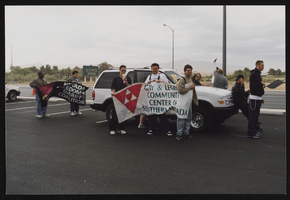
Gay and Lesbian Community Center of Southern Nevada and the Nevada Freedom to Marry Coalition at the second annual Gay Pride parade: photographic print
Date
Archival Collection
Description
Image
Ruth Poirier oral history interview
Identifier
Abstract
Oral history interview with Ruth Poirier conducted by Joanne Goodwin on February 05, 2003 for the Women's Research Institute of Nevada (WRIN) Las Vegas Women Oral History Project. Poirier opens her interview by discussing her partner Doris Pressler, who had passed away before the interview. She describes Doris' upbringing, her role in the first band at the Roseland Ballroom in New York, and explains how an all-women band in the 1930s and 1940s was a phenomenon. Poirier then discusses her own history, including how she became involved in music and all-women bands, and how she met Doris. Poirier describes in detail the importance of music to her family, the types of music she played, and what it was like to be a musician during the Depression. She talks about her relationship with Doris and recalls early interactions with other gay youths. Poirer ends her interview explaining why she and Doris decided to settle in Las Vegas, Nevada, and describes their impressions and involvement with the local LGBTQ+ community.
Archival Collection
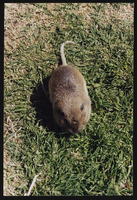
Ground squirrel at Gay Pride: photographic print
Date
Archival Collection
Description
Ground squirrel at Gay Pride at Sunset Park, 1999. Photographer: Dennis McBride. (5-8-99).
Image
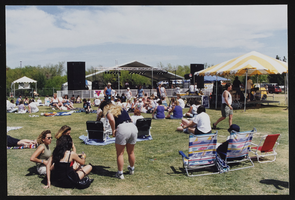
People sitting on the lawn at Gay Pride: photographic print
Date
Archival Collection
Description
Gay Pride at Sunset Park (5-8-99) Photographer: Dennis McBride
Image
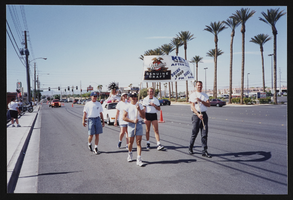
Keys Lounge in the Gay Pride parade: photographic print
Date
Archival Collection
Description
Gay Pride 1999 at Sunset Park; Photographer: Dennis McBride. Keys Lounge.
Image
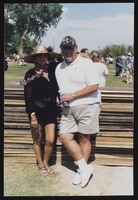
Bee and Peter Tadora at Gay Pride: photographic print
Date
Archival Collection
Description
Image
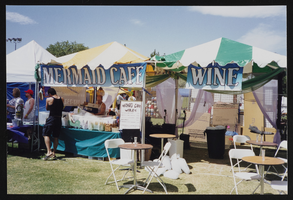
Mermaid Café booth at Gay Pride: photographic print
Date
Archival Collection
Description
Image
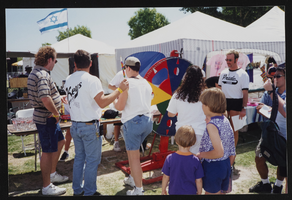
Keys Lounge booth at Gay Pride: photographic print
Date
Archival Collection
Description
Image
